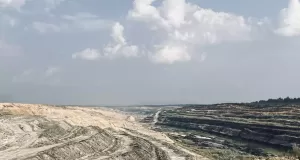- There was long struggle against POSCO from 2005 to 2016. The government forcefully acquired 2700 acres of forest land where villagers had been cultivating betel vines for more than a hundred years. But because of people’s struggle and legal battle in the National Green Tribunal, the delay to get lease of iron ore mines forced POSCO to quit. The villagers of Dhinkia were in the forefront of this struggle, with a key role being played by the women of the region in this long struggle.
Now, the government of Odisha has invited JSW Utkal Steel Ltd to set up even more harmful projects like cement and thermal power plant. These will lead to further green house gas emissions, polluting not just the four Gram Panchayats of this region but also the region of Paradeep where already many chemical polluting industries exist. Once again, the government has indulged in forceful land acquisition with the help of brutal police repression like threats, lathi charge and jailing the leading activists. Near about one thousand acres of cultivated land of betel vines have been forcibly destroyed, without the consent of farmers who are entitled to ownership of their lands under FRA 2006. The struggle goes on.
- In Koraput district, tribal people of 44 villages under Similiguda Block have been resisting since 2003, and refusing to allow mining of bauxite in Maliparvat. This mountain has 36 perennial streams which feed water to river Kolab which is the life line of the district. This is a forest protected and nursed by the villagers, has medicinal plants and provides fodder for domestic animals like cows and goats. The perennial water sources are gifts of nature. The villagers have a sustainable livelihood system of agriculture, especially production of vegetables which are being marketed in the local markets as well as outside the district.
The Odisha government had given lease for mining six million tons of bauxite for 20 years to the Aditya Birla group in 2007, but it failed to begin mining because of people’s resistance. Again in 2021, a fresh lease for mining 6 million tons for 50 years has been given there, without the consent of the Gram Sabha. In November 2021, a public hearing for environmental clearance was conducted, without allowing the people who were resisting mining to be present.
To suppress the dissidents and get the hearing approved in favour of the company, police arrested and jailed the community leaders and prevented the villagers for participating in the hearing, against which a PIL has been filed in the High court to cancel the one-sided hearing. Tribal people of Maliparvat are determined to save this natural resource not only for their right to livelihood but also for their future generations in the interest of climate justice.
- In 2021 the government of Odisha auctioned 7 virgin forests for mining of bauxite and iron ores not to particular industries that would use these ores but to companies for marketing these ores in the open market for profits. This is very dangerous method of earning revenue, as it will exhaust these mines, adversely affecting the coming generations as well as worsening the climate crisis. All these actions took place in tribal areas which are scheduled areas where consent and consultation of the Gram Sabha is a must, as per FRA-2006 and PESA 1996 respectively. Among these two vast natural resources, the most important are Karlapat forest in the Kalahandi district, which is a reserved forest where the Khandualmali hill is located, and Gandhalpada village of Keonjhar district, which need to be protected, conserved and preserved not only for the future but also for the present as there are sustainable livelihood systems for human beings, wild life as well as the springs which provide water to the rivers in the region. Other five iron ore mines are located in Puribahal forest, Chandiposh forest, Jhumukapatharposhi, Netrabandha pahad and Dhalta pahad. All of these are also virgin forests which have been auctioned for mining in Sundargarh district.
4. The mining lease in Karlapat has been allotted to Vedanta company through auction in September 2021 without taking approval or consent of the concerned Gram Sabhas. It has a wildlife sanctuary and important elephant corridors. It has many perennial streams. Once mining begins here, the entire Khandualmali forest area will gradually be taken over by the corporates for their profiteering. This process of unrestrained mining of bauxite will completely destroy the green natural forest having economic trees like Kendu, Mahua, Mango, Jack fruit and many others, along with 350 big and small streams which are the main perennial source of water to rivers like Indravati and Nagabali which are vital for agriculture and power generation in Odisha and A.P.
Thousands of villagers, especially the tribals and Dalits of more than 200 villages, have traditional rights over this natural resource which has to be saved from destruction by mining for sustainable development and climate justice for present and future generations. In the past there were resolute moves to grant mining leases to corporate houses, but these have been strenuously opposed by the local tribals for the past 10 years. The tribals have organised under the banner of Khandualmali Sthai Surakhya Samiti (KSSS) and have built a strong resistance to the mining lease in Karlapat forest. The goal of the movement is to declare Khandualmali forest free from mining.
5. Tribal communities of Keonjhar district and Sundaragarh district have been victims of unlimited extraction of minerals for decades. Agony of the displaced tribals in these districts is not heard and not felt by the government nor by the beneficiary class. As a result of the destruction of the forests which are the natural habitats of tribal communities, they have been displaced forcefully without proper rehabilitation. They are left with polluted dust and dry streams.
In Keonjhar district there are a few green forests that still remain, but are waiting to be annihilated by mining companies. One of these is Gandhalapada in Joda block. This forest is a very pristine natural forest having more than 8 lakh trees of which 75% are sal trees. This forest has 340 million tons of rich iron ore, and for mining of this ore, auction for the lease took place without consent of the Gram Sabha, which is mandatory as this district belongs to a Scheduled Area under the 5th Schedule of the Constitution.
A sal tree matures in 30 years. This tree is very valuable for a natural forest. A natural sal tree lives for 150 years, so the sustainability of free clean air and water source is inherited with such forests. So the need of the hour is to protect such forests from exploitative mines. While these mines are also being leased out to corporates, under the excuse that it will give a boost to state revenue, but huge profits will be made by the miners at the cost of natural forests and future generational equity and justice.
In the last 15 years two major successful anti-displacement movements took place in Keonjhar district against Sterlite and Mittal Steel Companies to protect 15,000 acres of agricultural land along with villages. Because of these movements, three steel companies had to quit. Now the government is planning to invite other companies to acquires the said land. Ultimately Keonjhar district will be converted into a dry deserted land.
There are another 5 small virgin forests in Sundargarh district in which mines of iron ores have been leased out for marketing. These are the main source of livelihood of tribals and landless poor people.
- In Malkanagiri district there is a plain dense forest known as Ketameta forest on the bank of river Saberi, having valuable trees with long life, like Kendu leaf, Mahula flower, Garda, Mango etc. In the year 2020, 1000 hectares of this forest had been leased out to Dalmia cement company for mining of lime stones without informing and without getting consent of Gram Sabha of 16 villages attached to the forest, as is mandatory under the FRA 2006 and PESA. The main and sustainable source of livelihood of more than 50 villages is this forest. The public hearing for environmental clearance took place in the month of March 2022 without allowing the villagers who opposed the mining to participate. The district administration along with the State Pollution Control Board conducted the public hearing with a handful of company supporters, using the police force to keep out the protesting villagers. Behaving as agents of the company, some police officers threatened the villagers not to attend the hearing and oppose the project. There will be a cement plant near the mines. It will lead to acute pollution, and the water of river Saberi will be over consumed by the company and will be polluted. This will force the villagers to be displaced without any rehabilitation and fair compensation. When blasting will take place, the polluting dust will be spread in the air and water life will also be adversely affected in the victimised villages. In the name of development, the government is helping the corporates to maximise their profits at the cost of natural forests and sustainable livelihood system of tribals and forest dwellers who will be forcibly deprived of their right to clean air and clean and unpolluted water.
- The Banai Subdivision of Sundargarh district is full of iron ore mines and sponge iron factories which are heavily polluting plants. The Odisha Mining Corporation is destroying natural forests for mining of iron ore, depriving tribals of their right to natural habitats. Now Khandadhar waterfall is under threat by these mining activities. This is one of perennial sources of water to river Brahmani. Banei is surrounded by more than 10 sponge iron projects whose emissions of huge amounts of carbon dioxide is extremely injurious to human health and harmful to agricultural activities and water bodies. Again and again through the Odisha Industrial Infrastructure Development Corporation or IDCO, the government takes community lands and allots them to private companies including polluting plants even in forest areas. This acquisition of lands by IDCO is in violation of of PESA, FRA and the 5th Schedule of the constitution. In Kapanda forest the Kai International Limited has been allotted a plot of land having more than 1.5 lakh trees. Last year, it cut down more than ten thousand trees without permission. The people have been protesting against these tree cuttings and the pollution caused by the company, and they have got a stay order from NGT not to continue tree cutting. These are tribals and general communities. They have been attacked by company goons. The police has prevented people and activists like Prafulla Samantara to have mass meetings to protect the forest. A medium dam was constructed at Rukuda near Banei forcefully displacing forest dwellers who had received forest land patta under the FRA. Since 2014 they have been struggling for compensation but have not been heard by the government.
- In coastal Odisha, the government has been inviting private corporations to set up private ports which will destroy the coastal ecology which is the main source of traditional fisher folks. The coastal lands have been forcibly acquired displacing thousands of villagers from their cultivation. In Baliapal, the place of historical successful people’s struggle against Defence Missile Centre, in the name of development, Tatas have been permission to construct a port; there is also a petrochemical complex coming up in the region. The affected villagers of five gram panchayats have been resisting these projects for years. Unconcerned, the government has given the green signal for more such ports, to transport the ores from the mines of Odisha. As if this was not enough, the state government has also proposed the setting up of river ports by Adani and other corporates on the rivers Brahmani and Mahanadi. These upcoming projects not only affect the natural flow of water but also pollute and reduce the water flow, adversely affecting the farmers.
- On the Puri coast, violating coastal regulations, more than 2000 acres of coastal forest land will be diverted for an airport depriving thousands poor villagers from their right to livelihood. A struggle is going on to protect Sipasarubali coastal forest land under the leadership of the Upakuliya Jami o Jangal Surakshya Samiti; the government has kept its leader in jail on false grounds for more than 9 months.
- After denationalising coal mines, the government of India is soon going to begin the process of inviting tenders for auction of coal Blocks in many states. In Odisha more than 33,000 acres of forest and agriculture lands will be lost to these coal mines. Many populous villages of Chendipada Block will perish. Thousands of people including tribals will be displaced by mining in 11 coal blocks in Angul and Jharsuguda districts. In Talabira coal block of Jharsuguda district, villagers have been opposing cutting of trees in the forests for mining of coal by Adani and Birla companies. Many villagers are being threatened by the police and arrested when they resist illegal dumping of mining waste on their agricultural lands. There is no rule of law in the mining areas where people are waging intense struggles against corporate capture.
The forest department is not providing information on the present status of forests which are to be handed over for mining. The Right to Information (RTI) in the state has become functionless. Democratic rights and fundamental rights are under peril in regions where corporates are invited to grab the land and other natural resources. The state acts like a police state, as an agent of corporate interests. United struggle is the need of the time to protect the rights of the people over natural resources and democracy.
In Odisha the BJD government under the Chief Ministership of Naveen Patnaik and run by a handful of bureaucrats does not have any time for dialogue; the CM is not accessible to either the public or his own Ministers and MLAs. The extractive industries are source of political funds for the ruling parties in the State as well as the Centre. Mining is the biggest source of political corruption because of which the people are poor even though the state is rich in natural resources, which are being depleted day by day by the corporates patronised by the state.
In the era of corporate capture in India, the Union Government through the Ministry of Forest, Environment and Climate Change is now proposing to modify the rules under the Forest Conservation Act 1980 to override the power of Gram Sabha in FRA 2006 and PESA 1996 as well as the provisions for conservation of natural forest in FCA 1980. This will pave the way to finish deep green forests which are source of water in streams and rivers. This is being done to hand over forests for non-forest activities to the private companies without prior and fair information and free consent of forest dwellers. In Odisha it will have disastrous effects not only on livelihood of tribals and their habitat rights but also on climate justice. In the 75th year of our Independence, our democracy and constitutional rights are in peril under the present communal and corporate fascist regime. The only way out is to use the weapon of Satyagraha to save our Constitution and democracy.
(Prafulla Samantara is an iconic environmental activist associated with the Lohia Academy, Bhubaneswar, who has been awarded the Goldman Environmental Prize for his work.)




